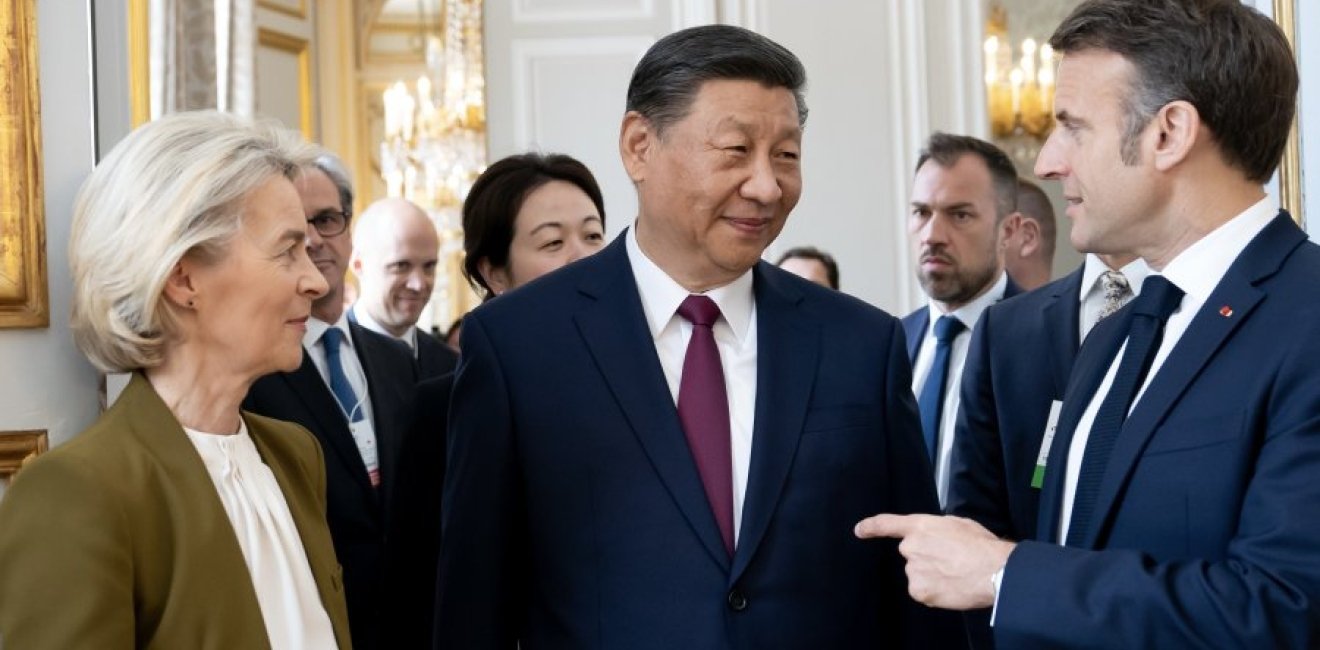From May 6 to 10, Chinese President Xi Jinping was on his first European tour since the start of the COVID-19 pandemic. He began in France by meeting his French counterpart Emmanuel Macron and the European Commission President Ursula von der Leyen. The trip continued to Serbia and Hungary, two countries with much closer and friendlier ties to China. Our experts share their insights on the key takeaways from the visit.
Klaus Larres, Fellow at the Wilson Center and Richard M. Krasno Distinguished Professor of History and International Affairs at The University of North Carolina (UNC) at Chapel Hill
For years Beijing has pursued two major objectives regarding Europe. Xi Jinping’s recent tour of three European countries was meant to contribute to the realization of these objectives. First of all, the Chinese leader wishes to detach the European Union and its 27 member states from their close relations with the United States. Secondly, Beijing also wishes to drive a wedge between the European powers themselves and divide them in their policy approach toward China.
Xi Jinping’s visit to France, Serbia and Hungary was certainly meant to further the realization of these objectives. After all, French President Macron is pursuing a more independent role for Europe in world affairs, which depends less on the US. Even before Russia’s full-scale invasion of Ukraine he has talked about the necessity to obtain “strategic autonomy” for the EU and has expressed skepticism about the influence of the US in European affairs.
While Xi’s visit to Serbia and Hungary was provocative and was bound to annoy the EU, the most important part of Xi’s European tour was his visit to France where he met with both French President Macron and President of the European Commission Ursula von der Leyen. As German Chancellor Olaf Scholz had just visited Beijing himself he turned down an invitation to participate in the meeting with Xi in France. Thus, it was left to Macron and von der Leyen to play good cop and bad cop.
While Macron largely remained conciliatory and emphasized the importance of China in world affairs and the wisdom of maintaining good European-Chinese relations, von der Leyen remained much more hardnosed. She referred to the increasingly difficult economic and political relations between the EU and China, including recent disconcerting Chinese disinformation and espionage incidents. She also pointed to China’s ever increasing serious cyber-attacks on EU members and institutions.
It is difficult to judge how Xi interpreted his conversations with Macron and von der Leyen. Perhaps he was meant to obtain the impression that the Europeans have begun to pursue a much more hard-nosed and tough China policy than hitherto but that all is not yet lost. If China should begin to play by the economic and geopolitical rules, the Europeans will be happy to (yet again) embark on a new policy of engagement with it.
Maša Ocvirk, Program Coordinator, Global Europe Program at the Wilson Center
President Xi Jinping’s visit to Europe had an interesting, although unsurprising route. Next to France, he visited Serbia and Hungary, whose respective leaders have shown affinity to the Chinese president and Chinese investments.
As expected, there were limited results from Xi’s visit to Paris. President Macron was joined by President of the European Commission von der Leyen in attempt showcase a unified EU position against China’s trade practices and ‘no limits’ relationship with Russia. However, both Macron’s charm offensive and von der Leyen’s tough position on China’s “unfair” government subsidies, seemed to have little impact on Xi.
But the Chinese leader, together with his 400-person delegation, came equipped with deliverables for the rest of his European tour. During the official visit in Serbia, President Vučić and Xi declared an “ironclad partnership” while commemorating the 25th anniversary of the NATO bombing in Belgrade that also struck the Chinese Embassy. The joint commemoration of this unfortunate incident serves a symbolic showcase of how both leaders view NATO. President Xi also reaffirmed China’s support for “Serbia’s efforts to preserve its territorial integrity regarding Kosovo.” This goes against EU-led efforts to normalize relations between Serbia and Kosovo—an integral part of the process to steer both countries towards a common European future.
In Hungary, President Xi was similarly welcomed with open arms. Hungary’s Prime Minister Orban announced the opening of a second Chinese electric vehicle factory as a well as the signing of 16 cooperation agreements to enhance economic and cultural cooperation. This deepening of economic ties is in direct opposition to the EU’s approach of “de-risking” from China. It positions Hungary as a Chinese foothold in the EU Single Market and as the weakest link in maintaining European unity on China.
Xi’s European tour shows he understands the importance of the European market for continued growth of the Chinese economy and his strategy for this is clear—divide and conquer. Investing heavily in Hungary is already yielding results. The country has blocked several EU statements condemning China’s human rights violations and was also the only EU member state that supported China’s Peace Plan for Ukraine. Xi’s visit therefore serves to highlight where the Chinese government will seek to sow discord from within the EU and the Western Balkans.
Lea Thome, Schwarzman Fellow at the Wilson Center
President Xi’s visit this week to France, Serbia, and Hungary only further cements China’s ambition to reset its relationship with Europe. But China is also attempting to shift public opinion and win back the hearts of the European people. Xi’s articles–published in local languages on the days of his arrival in the three European countries he visited–exemplify this endeavor.
In Le Figaro, Xi reminisced about how France aided China in establishing some of its naval establishments in Fujian over 150 years ago. In Serbian newspaper Politika, Xi commemorated the 25th anniversary of the bombing of the Chinese embassy in Belgrade. In Magyar Nemzet, Xi expressed the desire for Hungary and China to lead the ‘right’ direction of Europe-China relations.
Xi’s appeal to the European public reveals that China is intent on reinvigorating closer and deeper engagement with Europe again. This comes at a time where the European continent is still rattled by the ongoing war in Ukraine and by the upcoming US election, which will determine the future proximity of the transatlantic relationship.
But European leaders and people still remain critical of China’s sincerity, given its no-limits partnership and support of Russia. This was a topic addressed at the Macron-Xi meeting, which saw China committing to not sell arms to Russia. Now the ball is in the court of Xi and China to establish its credibility on this commitment and to the broader Europe-China relationship.
Carine Guerout and Timmy Romar, Staff Assistant Interns, Global Europe Program at the Wilson Center
The Xi visit took place in the context of a fraying relationship between the EU and China, with a looming trade war and increasing concerns about China’s role in the Russia’s invasion of Ukraine. Growing distrust towards China is empowering transatlantic unity, with the United States and the EU both agreeing on the need to counter China’s trade practices. Recently, the EU has adopted a more assertive approach of “de-risking” by initiating an investigation into China's procurement of medical devices, following a similar probe into electric vehicles, echoing the US strategy of reducing economic dependence on China. The objectives are to protect domestic vulnerable industries and to fence off strategic products that could benefit China’s military industrial complex. The growing concern about Chinese espionage further contributes to this deteriorating relationship. However, while Commission President von der Leyen was at the meeting with Xi alongside President Emmanuel Macron, German Chancellor Scholz turned down the French President’s invitation. This undermines the EU’s unified stance towards China, which Xi is keen to capitalize on.
Previously, Macron diverged from his EU counterparts by adopting a friendlier stance vis-à-vis China, notably expressing reluctance over European involvement in a potential confrontation over Taiwan after meeting Xi last year. This time around, the French President’s rhetoric has undergone a significant change. While highlighting the threat of Chinese subsidies to the EU internal market, Macron also advocated for increased access of European companies to Chinese consumers. Additionally, he sought to constrain the China-Russia “no-limits” relationship, which is perceived as helping Moscow’s economy and war efforts in Ukraine, despite Western sanctions. But Macron’s concerns fell on deaf ears. Xi proclaimed such statements are smearing China and drag the country into a “new cold war”. While the Chinese premier did support Macron’s calls for a global military truce against the backdrop of the Paris Olympics, Beijing’s commitment to this initiative remains uncertain.
Authors

Richard M Krasno Distinguished Professor in History & International Affairs at the University of North Carolina at Chapel Hill





Global Europe Program
The Global Europe Program is focused on Europe’s capabilities, and how it engages on critical global issues. We investigate European approaches to critical global issues. We examine Europe’s relations with Russia and Eurasia, China and the Indo-Pacific, the Middle East and Africa. Our initiatives include “Ukraine in Europe”—an examination of what it will take to make Ukraine’s European future a reality. But we also examine the role of NATO, the European Union and the OSCE, Europe’s energy security, transatlantic trade disputes, and challenges to democracy. The Global Europe Program’s staff, scholars-in-residence, and Global Fellows participate in seminars, policy study groups, and international conferences to provide analytical recommendations to policy makers and the media. Read more


Kissinger Institute on China and the United States
The Kissinger Institute works to ensure that China policy serves American long-term interests and is founded in understanding of historical and cultural factors in bilateral relations and in accurate assessment of the aspirations of China’s government and people. Read more

Explore More
Browse Insights & Analysis
The OSCE is a Good Value for America



